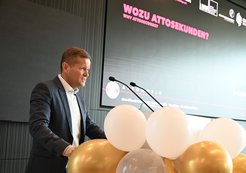Nobel Symposium for Ferenc Krausz
Why attoseconds? With this motto, Ferenc Krausz opened the exciting programme of the MPQ Nobel Symposium in celebration of his Nobel Prize in Physics 2023. Among the guests and speakers were also many of his former companions.
On the occasion of the award of the Nobel Prize in Physics to MPQ Director Ferenc Krausz, the institute organised a symposium that was held on Wednesday 21 February. Under the title "Why attoseconds?", Ferenc Krausz and old colleagues from the early years of attosecond physics gave lively insights into the progress of this new research field, which began in Vienna in the late 1990s, produced the first attosecond pulses in 2001, and has continued to present new successes and milestones at MPQ and LMU Munich ever since. In the audience were staff and external scientific members of the institute, the MPQ board of directors, as well as alumni and former colleagues of Ferenc Krausz which today are partly scattered all over the world.

„Thanks, Ferenc, for all the outstanding research that you have done, that you are doing, and you will do in the future. We are very proud of you and very privileged to be your colleagues. Your dedication and passion are an inspiration to us all. We look forward to witnessing your continued success and the impactful work you will undoubtedly accomplish in the future“, said Ignacio Cirac, Managing Director at MPQ, opening the Nobel Symposium.
Why attoseconds? In his introduction to the lecture programme, Ferenc Krausz explained how attosecond pulses first made it possible to detect the movement of electrons and pointed out the promising applications of the developed ultrashort pulse technology for the early detection of deseases. Topics that attoworld's scientific groups such as BIRD, FRIS and Data Science in cooperation with the Center for Molecular Fingerprinting (CMF) in Hungary are actively researching today.
Tracing back the exciting developments in attosecond physics of almost 30 years since its birth, Prof Alexander Fürbach (Macquarie University, Australia), Dr Michael Hentschel (Austrian Institute of Technology, Austria) and Prof Reinhard Kienberger (TU Munich) gave further illustrative and entertaining talks - always spiced up with pictures from the time spent researching together with today's Nobel Laureate.
In addition to the photos and documents, which also impressively captured the conditions of almost three decades ago, the speakers were united by their charming Austrian dialect, and one really felt a bit transported to the TU Vienna.
Dr Ernst Fill (MPQ) then drew a bit of a wider picture with a scientific presentation on MPQ laser research since the early years of the institute's foundation and the groundbreaking discoveries that resulted from this. Which include not at least Theodor Hänsch's frequency comb technology, for which he was awarded the Nobel Prize in Physics in 2005.
Finally, former MPQ PhD student and postdoctoral researcher Dr Hanieh Fattahi, who is now a research group leader at the MPI for the Physics of Light in Erlangen, took the audience on "a blink of an attosecond" short journey of developments in attoworld research - impressively illustrated with a very respectable series of high-ranking journal cover stories.
Afterwards, guests and members of the institute were able to round off the evening together with a small reception, intensive discussions and the exchange of memories. For the alumni and former colleagues of Ferenc Krausz who had travelled to the event, the programme continued on the following two days with an Alumni Symposium of the attoworld Group.












